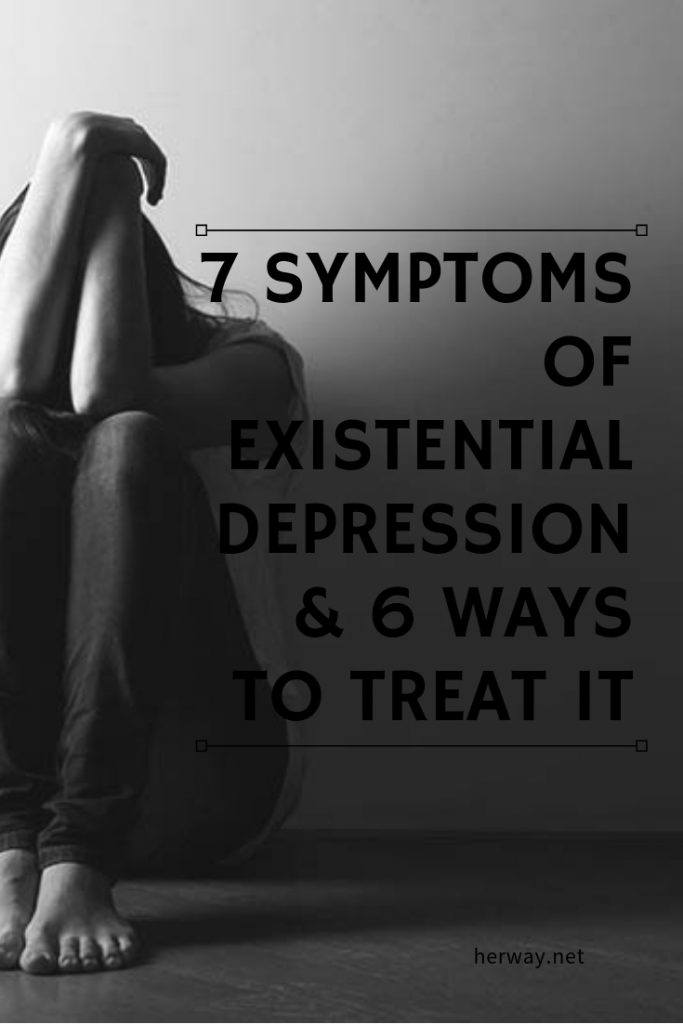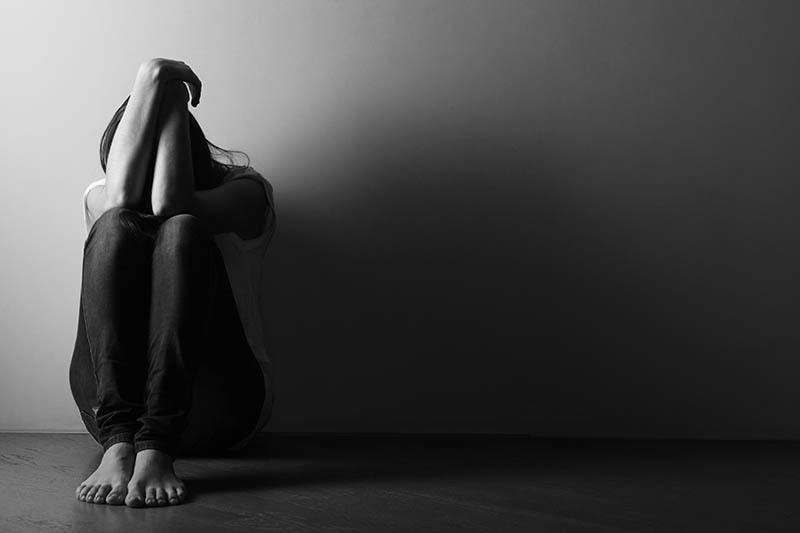7 Symptoms Of Existential Depression & 6 Ways To Treat It
What Is Existential Depression?
There are many forms of depression and existential depression is just one of them.
However, this kind of depression is quite special in more than one way.
First and foremost, existential depression is difficult to diagnose.
Also, this type of depression can occur at all ages and doesn’t have to be strictly connected with a certain event in someone’s life.
It can be a consequence of some big change, part of a midlife crisis, or part of a person’s identity search.

What is interesting about existential depression is that it usually affects gifted individuals who are trying to get to the bottom of their existence.
It is a state characteristic of gifted people who are overly concerned and worried about questions of life, death, freedom, isolation, and meaning.
Even though experiencing existential depression is nowhere near joyous for those who are fighting it, there are also some experts who see it as a form of catharsis and a part of positive disintegration.
Some see it as a gift and chance for personal growth, a test of one’s spiritual and mental power and strength aka spiritual awakening.
Either way, the bottom line is that existential depression is something that should be taken seriously.
Nevertheless, despite being difficult to handle, it doesn’t mean that it can’t be successfully treated.
However, before expecting to learn how to successfully handle existential depression, first you have to know how to recognize it.
Here are 7 signs to help you do just that.
7 Signs Of Existential Depression
1. You’ve isolated yourself from society
One of the first signs that you’re experiencing existential depression is voluntary isolation from the world.
You spend most of your days in complete solitude and feel like no one really gets you.
Even though we all need some time to relax by ourselves, with you, it’s different; being on your own has become a habit of yours.
It’s not just that you can’t stand being in crowded places or that you’ve become an introvert who doesn’t want to meet new people, you literally can’t stand anyone’s presence around you.
All of a sudden, without any specific reason, you’ve cut ties with your closest friends and family members, even though they did you no harm.
You’ve started living your life as a loner because being near someone else provokes unrest and unease you can’t explain to anyone, including yourself.
2. You’re anxious and pessimistic about the world’s future



The most common symptoms of existential depression are existential crisis and anxiety which usually follows it.
When you suffer from existential depression, your world views are always negative and pessimistic, and you never see the light at the end of the tunnel.
You’re overly concerned with the future of the world in general and the psychological state of the entire human race.
Even though these are all real life problems that we should all have in mind, the difference between you and the rest of the people is that these thoughts have prevented you from leading your everyday life because you see it as being doomed to fail.
Not only that, you see entire human race as hopeless and helpless.
In your mind, there doesn’t exist a better tomorrow or the possibility of things ever improving.
3. You’re interested in the meaning of life and death
Another sign of existential depression and existential crisis is the fact that you’re also overly concerned with the deeper meaning of things, especially of life and death.
Why are we sent to this planet? What is our purpose in this world?
What is the point of living if we’re all about to die anyway?
What is the point of trying to make our lives better when we’re all destined to vanish one way or another?
Does there exist life after death? Does our soul transcend into another dimension or do we simply disappear as if we never existed?
Why was the universe even created in the first place? What is the purpose of the human race on this planet?
These are the existential questions that keep you up at night and the things that prevent you from functioning properly.
You think that your existence is completely meaningless and you see no point in helping yourself and trying to move away from this depression you’re facing.
4. You sleep too much



None of these dark and negative thoughts leave you alone even for a minute.
No matter what you do and how hard you try to reprogram your brain to think about something else, you simply can’t get rid of them.
That is exactly why you seek comfort in sleep because this is the only period of the day when you don’t feel like you’re haunted by your mind that you can’t seem to control.
We all need enough time to rest both brain and body, and taking a nap from time to time isn’t something that should concern anyone.
Nevertheless, if sleeping is the highlight of your day and if you spend all of your time anxiously awaiting to go to sleep, being the only thing that makes you calm and peaceful, then you have a problem.
5. Nothing makes sense any more
When you’re dealing with existential depression, everything in your life has lost sense.
You don’t enjoy the little things anymore and literally nothing and nobody can make you happy.
You don’t look forward to weekends, holidays, watching your favorite TV show, or spending time with your loved ones.
You see no way out of your current state and it’s like you’re just living because you have to.
With time, you turn into an emotionally unavailable robot – you don’t get excited, happy, or aroused, and nothing brings you joy anymore.
Everything has become a flatt line and you feel like you’ve become completely numb.
It’s not only that you don’t feel positive emotions anymore, you’ve lost the ability to be moved or touched by anything sad as well.
It’s like you’ve become completely indifferent towards anything going on in your life and as if you’ve lost all empathy toward other living creatures.
6. You have no motivation



People with existential depression have no motivation whatsoever.
With time, simple everyday tasks, such as getting out of bed, going to work, or engaging in social activities become too much to handle and an enormous burden on the chest. And you’re no exception.
All of a sudden, you’ve stopped pursuing your life goals and chasing your dreams.
Everyone around you assumes that you’ve just become lazy and lethargic, but with you, it’s more than just that.
No matter how hard you try, you can’t get yourself to function properly, let alone make some bigger changes in your life.
It’s like you’re stuck in one place and you can’t muster the strength needed to move from the dead spot.
The worst part is that you’re actually aware of your state, but you can’t force yourself to make a difference, as much as you’d like to.
7. You have suicidal thoughts
Even though this is something you don’t tend to talk about, it is nothing unusual for a person with existential depression to be suicidal.
Lately, you’ve been spending your days waiting to die and you’ve convinced yourself that nobody would miss you and that the world wouldn’t feel your absence.
First and foremost, thinking this way is not something you should be ashamed of.
Nevertheless, if these thoughts are something you’ve experienced during your struggles with existential depression, it means it’s finally time to start working on your mental health.
It is a clear red flag that you should try and find ways to fight it and here is exactly how you’ll do it.
I won’t lie to you – there is no magic medicine that will help you get out of this overnight.
What you need to understand is that existential depression is not an illness, so there is no need for it to be cured.
However, it can be treated and dealt with successfully. Here are 6 bulletproof ways to do it.
6 Successful Ways To Handle Existential Depression
1. Remember that you’re not alone



First and foremost, you need to be aware that there are many gifted children and gifted adults all around the globe who go through everything you’re going through right now.
You’re not alone in this world, even though it appears that way right now.
2. Find what fulfills you
Some of the biggest problems with existential depression is the void everyone suffering from it feels, and the fact that you’ve convinced yourself that you’ve lost purpose in this life.
This is exactly why it’s crucial to find what fulfills you and, if need be, reinvent yourself.
It’s clear that nothing from your life makes you happy and the solution to this is finding new things and people that will put a smile back on your face.
It’s time to search yourself all over again!
No matter how old you are, don’t be scared of trying new things, hobbies, and meeting new people, because that is the only way to find what fulfills you.
3. Accept life as a journey



Instead of thinking about life as some destination you need to reach, think of it as a journey to self-discovery you need to enjoy while it lasts.
Think of it as a path and make your mission to ensure it is as memorable as possible.
Accept that you can’t control everything and that there are some things our mind can’t comprehend.
So, instead of cracking your brains open about the circumstances you can’t have any impact on whatsoever, focus on making the best of every day.
Remember that your happiness is exclusively in your hands and you’re the master and ruler of your own life. Make it worth living!
4. Rationalize your thoughts
Another successful way of fighting existential depression away is to rationalize your thoughts and fears as much as possible.
Whenever you feel like everything is going downhill and you won’t make it out of a certain situation, remember all the challenges you’ve managed to defeat in your past and all the obstacles you’ve overcome up to now.
Also, whenever you start with the negative overthinking, think of all the worst negative case scenario options running through your head and be realistic about the possibility of all of them coming true.
If necessary, write these things down on a piece of paper and read it every time you start feeling hopeless and lost.
5. Write down some affirmations



What you also need to write down are positive thoughts, even though they’re probably quite rare.
Instead of focusing on your pessimism, put in an effort to note all the beautiful things you see and events going on around you every day, then use that list as a reminder that not everything is so gloomy.
Make it a habit of yours to think of at least five good and positive things that have happened during the day every night before going to sleep, which will reprogram your brain to think more optimistically in no time.
Don’t hesitate to compliment yourself.
When you’re feeling down, think of your accomplishments or stand in front of the mirror and name a few beautiful things about yourself.
Don’t hesitate to admire yourself!
6. Seek professional help
It is nothing unusual for people to be unable to chase away their mental illnesses alone and nothing embarrassing in asking for help.
However, there are situations when your loved one simply doesn’t know how to approach you and can make things even worse, thinking that they know what’s best for you.
That is exactly why seeking professional counseling and guidance is always the right thing to do.
Besides, sometimes it is easier to open up to a complete stranger who you know will give you a hand the proper way than to the people close to us.
This is someone who will never judge you or look down on you because of your problem and, most importantly, a professional who will help you the right way.


What to read next:
Source: https://numerologybox.com
Category: Depression





